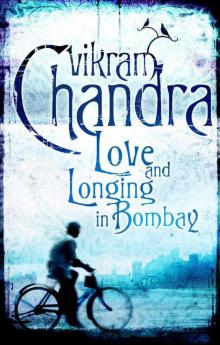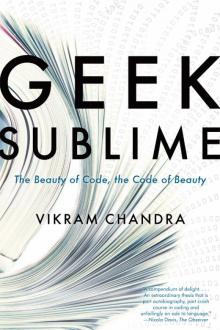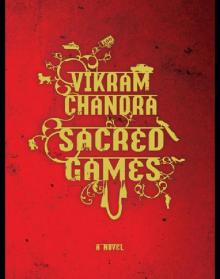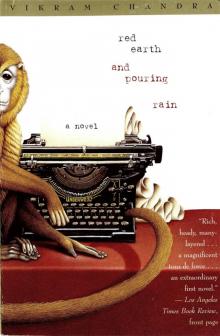- Home
- Vikram Chandra
Sacred Games Page 2
Sacred Games Read online
Page 2
Parulkar shut the door, and led Sartaj around the back of the cabin, to a very small kitchen which now boasted a gleaming new Brittex water filter on its wall. Parulkar pressed buttons and a bright stream of water fell into the glass he held below.
‘It tastes very pure, sir,’ Sartaj said. ‘Very good indeed.’
Parulkar was drinking deep draughts from a steel tumbler. ‘I asked them for their best model,’ he said. ‘Because clean water is absolutely necessary.’
‘Yes, sir.’ Sartaj took a sip. ‘Sir – “daring”?’
‘They like daring. And you had better be daring if you want to stay in this job.’
Parulkar had sloping shoulders and a pear-shaped body that defeated the best tailors, and his uniform was crumpled already, but that was only usual. There was a sag in his voice, a resignation in his sideways glance that Sartaj had never known. ‘Is something wrong, sir? Is there some complication with the initiative, sir?’
‘No, no, no complication with the initiative. No, nothing to do with that at all. It is something else.’
‘Yes, sir?’
‘They are after me.’
‘Who, sir?’
‘Who else?’ Parulkar said with unusual asperity. ‘The government. They want me out. They think I’ve gone high enough.’
Parulkar was now a deputy commissioner of police, and he had once been a lowly sub-inspector. He had risen through the Maharashtra State Police, and he had made that near-impossible leap into the august Indian Police Service, and he had done it alone, with good police work, a sense of humour, and very long hours. It had been an astonishing and unparalleled career, and he had risen to become Sartaj’s mentor. He emptied his glass, and poured more water from his new Brittex filter.
‘Why, sir?’ Sartaj said. ‘Why?’
‘I was too close to the previous government. They think I’m a Congress man.’
‘So they may want you out. That doesn’t mean anything. You have lots of years left before retirement.’
‘You remember Dharmesh Mathija?’
‘Yes, that’s the fellow who built our wall.’ Mathija was a builder, one of the more conspicuously successful ones in the northern suburbs, a man whose ambition showed like a sweaty fever on his forehead. He had built, in record time, the extension of the compound wall at the rear of the station, around the recently filled lowland. There was now a Hanuman temple and a small lawn and young trees that you could see from the offices to the rear of the building. Parulkar’s passion was improvement. He said it often: we must improve. Mathija and Sons had improved the station, and of course they had done it for free. ‘So what about Mathija, sir?’
Parulkar was taking little sips of water, swirling it about in his mouth. ‘I was called to the DG’s office yesterday, early.’
‘Yes, sir.’
‘The DG had a call from the home minister. Mathija has threatened to file a case. He said he was forced to do some work for me. Construction.’
‘That’s absurd, sir. He came himself. How many times he visited you here. We all saw that. He was happy to do it.’
‘Not our wall here. At my home.’
‘At your home?’
‘The roof needed work urgently. As you know, it’s a very old house. My ancestral abode really. Also, it needed a new bathroom. Mamta and my granddaughters have moved back home. As you know. So.’
‘And?’
‘Mathija did it. He did good work. But now he says he has me on tape threatening him.’
‘Sir?’
‘I remember phoning him to tell him to hurry up. Finish the work before the last monsoons. I may have used some strong language.’
‘But so what, sir? Let him go to court. Let him do what he wants. Let him see what we do to his life here, sir. At his sites, all his offices…’
‘Sartaj, that’s just their excuse. It’s a way to put pressure on me, and let me know I am not wanted. They’re not satisfied with just transferring me, they want to get rid of me.’
‘You will fight back, sir.’
‘Yes.’ Parulkar was the best player of the political game Sartaj had ever known: he was a grandmaster of the subtle art of contact and double-contact and back-channel, of ministers and corporators cultivated and kept happy, business interests allowed room for profits, backslapping and exchanges with commissioners of police, favours finely weighed and dispensed and remembered, deals made and forgotten – he was an aficionado of the subtle sport, he was simply the best. It was incredible that he was so tired. His collar sagged, and the swell of his belly was no longer jaunty, only weighted by regret. He drank another glass of water, fast. ‘You had better get in there, Sartaj. They’re waiting for you.’
‘I’m sorry, sir.’
‘I know you are.’
‘Sir.’ Sartaj thought he should say something else, something full of gratitude and somehow conclusive about what Parulkar had meant to him – the years together, the cases solved and the ones left and abandoned, the manoeuvres learnt, how to live and work and survive as a policeman in the city – and yet Sartaj was able only to come to rigid attention. Parulkar nodded. Sartaj was certain he understood.
Outside the cabin, Sartaj checked the tuck of his shirt, ran a hand over his turban. Then he stepped in, and told the reporters about more policemen on more streets, about community interaction, about strict supervision and transparency, about how things were going to get better.
For lunch Sartaj had an uttapam sent to the station from the next-door Udipi Restaurant. The keen kick of the chillies was invigorating, but when he was finished, Sartaj was unable to get up from his chair. It had been a very light meal but he was crushed, pulped by lassitude. He was barely able to get up and pull the bench from the wall, to slip off his shoes and lie flat and very straight on the wood. His arms were crossed on his chest. A deep breath, then another, and the edge cutting into the back of his thigh receded, and in the swimming drowsiness he was able to forget details, and the world became a receding white blur. Yet a sharp undertow flung him into anger, and after a moment he was able to remember what he was restless about. All of Parulkar’s triumphs were going to be wiped away, made meaningless by an engineered disgrace. And once Parulkar was gone, what of Sartaj? What would become of him? Sartaj had begun recently to feel that he himself had accomplished nothing in his life. He was past forty, a divorced police inspector with middling professional prospects. Others from his batch had climbed past him, he was just pedalling along, doing his job. He looked into his future and saw that he would not achieve as much as his own father, and much less than the redoubtable Parulkar. I am quite useless, Sartaj thought, and felt very bleak. He sat up, rubbed his face, shook his head violently, and pulled on his shoes. He stalked into the front room, where PSI Kamble was rubbing his stomach lightly in circles. He looked quite satisfied.
‘Good lunch?’ Sartaj said.
‘Absolute top first-class biryani from that new Laziz Restaurant on S.T. Road,’ Kamble said. ‘In a fancy clay pot, you know. We’re getting very pish-posh in Kailashpada.’ Kamble straightened up and leaned closer. ‘Listen. You know those two gaandus who were encountered yesterday by the Flying Squad in Bhayander?’
‘Gaitonde gang, yes?’
‘Right. You know the Gaitonde gang and the Suleiman Isa gang have been stepping up their war again, right? So, I heard the two hits yesterday were a supari given by the S-Company. I heard that the Flying Squad boys made twenty lakhs.’
‘You’d better get in the squad then.’
‘Boss, what do you think I’m saving up for? I hear the going rate to get in is twenty-five lakhs.’
‘Very expensive.’
‘Very,’ Kamble said. His face was aglow, every pore open and alight. ‘But money makes it all happen, my friend, and to make money you have to spend money.’
Sartaj nodded, and Kamble sank into a register again. Sartaj had once heard it from a slumlord convicted of murder, the bitter secret of life in the metropolis: paisa phek, tamas
ha dekh. They had literally bumped into each other, walking round a corner in a basti in Andheri. They had recognized each other instantly, despite Sartaj’s plain clothes and the slumlord’s new paunch. Sartaj said, arre, Bahzad Hussain, aren’t you supposed to be serving fifteen years for offing Anwar Yeda? And Bahzad Hussain laughed nervously, and said, Inspector saab, you know how it is, I got parole and now it says in my file that I’m absconding in Bahrain, paisa phek, tamasha dekh. Which was absolutely true: if you had money to throw, you could watch the spectacle – the judges and magistrates trapezing blithely, the hoop-jumping politicians, the happy, red-nosed cops. Bahzad Hussain had the grace and good sense to come quietly to the station, and he was very confident, and wanted only a cup of tea and a chance to make a few phone calls. He made jokes and laughed a lot. Yes, he had thrown his money and watched the spectacle. All of this police jhanjhat was only a slight waste of time, nothing more. Paisa phek, tamasha dekh.
Kamble now had a family standing in front of him, a mother and a father and a son in blue-uniform short pants. The father was a tailor who had come back home from the shop early in the afternoon, to get some suiting material he had forgotten. On the way he had taken a short-cut and seen his son, who was supposed to be in school, playing marbles against the factory wall with some faltu street kids. The mother was doing the talking now. ‘Saab, I beat him, his father shouts at him, nothing helps. The teachers have given up. He shouts back at us, my son. He thinks he’s too smart. He thinks he doesn’t need school. I’m tired of it, saab. You take him. You put him in jail.’ She made the motion of emptying her hands, and dabbed at her eyes with the end of her blue pallu. Looking at her hands and finely muscled forearms, Sartaj was certain that she worked as a bai, that she washed dishes and clothes for the wives of executives in the Shiva Housing Colony. The son had his head down, and was scraping the side of one shoe against the other.
Sartaj crooked a finger. ‘Come here.’ The boy shuffled sideways. ‘What’s your name?’
‘Sailesh.’ He was about thirteen, quite wise, with a stylish floppy hairdo and flashing black eyes.
‘Hello, Sailesh.’
‘Hello.’
Sartaj smashed a hand down on to the table. It was very loud, and Sailesh started and backed away. Sartaj grabbed him by the collar and twisted him around the end of the desk. ‘You think you’re tough, Sailesh? You’re so tough you’re not scared of anyone, Sailesh? Let me show you what we do with tough taporis like you, Sailesh.’ Sartaj walked him around the room and through a door and into the detection room, lifting him off the floor with every stride. Katekar was sitting with another constable at the end of the room, near the squatting line of chained prisoners.
‘Katekar,’ Sartaj called.
‘Sir.’
‘Which is the toughest of this lot?’
‘This one, sir, thinks he’s hard. Narain Swami, pickpocket.’
Sartaj shook Sailesh so that his head wobbled and snapped. ‘This big man here thinks he’s harder than all of us. Let him see. Give Narain Swami some dum and let the big man see.’
Katekar lifted the cringing Narain Swami and bent him over, and Swami struggled and jingled his chains, but when the first open-palmed blow landed on his back with an awful popping noise he got the idea. With the second one he howled quite creditably. After the third and fourth he was sobbing. ‘Please, please, saab. No more.’ After the sixth, Sailesh was weeping fat tears. He turned his face away and Sartaj forced his chin around.
‘Want to see more, Sailesh? You know what we do next?’ Sartaj pointed at the thick white bar that ran from one wall to the other, close to the ceiling. ‘We put Swami on the ghodi. We string him up on the bar, hands and feet, and give it to him with the patta. Show him the patta, Katekar.’
But Sailesh, looking at the thick length of the strap, whispered, ‘No, don’t.’
‘What?’
‘Please don’t.’
‘You want to end up here, Sailesh? Like Narain Swami?’
‘No.’
‘What’s that?’
‘No, saab. Please.’
‘You will, you know. If you keep going like you are.’
‘I won’t, saab. I won’t.’
Sartaj turned him around, both hands on his shoulders, and walked him towards the door. Narain Swami was still bent over, and flashing an upside-down grin. Outside, sitting on a metal chair with a Coke bottle clutched between his knees, Sailesh listened quietly to Sartaj. He sipped his Coke and Sartaj told him how people like Narain Swami ended up, beaten up, used up, addicted, in jail and out of it, wasted and tired and finally dead. All of it from not going to school and disobeying his mother.
‘I’ll go,’ Sailesh said.
‘Promise?’
‘Promise,’ Sailesh said and touched his throat.
‘Better keep it,’ Sartaj said. ‘I hate people who break promises. I’ll come after you.’
Sailesh nodded, and Sartaj led him out. At the station gate, the mother hung back. She came close to Sartaj and held up her fisted hands and opened them. In the right there was the twisted end of her pallu, and in the left a neatly folded hundred rupee note. ‘Saab,’ she said.
‘No,’ Sartaj said. ‘No.’
She had oiled hair and reddened eyes. She smiled, barely, and held up her hands higher, and opened them further.
‘No,’ Sartaj said. He turned and walked away.
Katekar drove with an easy grace that found the gaps in the traffic with balletic timing. Sartaj pushed his seat back and drowsily watched him change gears and snake the Gypsy between trucks and autos with less than inches to spare. Sartaj had long ago learned to relax. He still anticipated a crash every few minutes, but he had learned from Katekar not to care. It was all confidence. You went forward, and someone always backed off at the last moment, and it was always the other gaandu. Katekar scratched at his crotch, growled ‘Eh, bhenchod,’ and stared down a double-decker driver, forced him to an absolute stop. They took a left, and Sartaj grinned at the wide swagger of the turn. ‘Tell me, Katekar,’ Sartaj said, ‘who is your favourite hero?’
‘Film hero?’
‘What else?’
Katekar was embarrassed. ‘When I do watch movies –’ He jiggled the gear stick, and wiped a spot of dust from the windscreen. ‘When there is some film on television,’ – which was only all the time – ‘I like to watch Dev Anand.’
‘Dev Anand? Really?’
‘Yes, sir.’
‘But he’s my favourite also.’ Sartaj liked the old black-and-white ones where Dev Anand listed across the screen at an impossible angle, unbelievably dashing and sublimely suave. In his limp perfection there was an odd comfort, a nostalgia for a simplicity that Sartaj had never known. But he had expected Katekar to be an Amitabh Bachchan extremist, or an enthusiast of the muscle boys, Sunil Shetty or Akshay Kumar, who stood huge on the posters like some new gigantic and bulging species. ‘Which Dev Anand film do you like best, Katekar?’
Katekar smiled, and tipped his head to the side. It was a perfect Dev Anand waggle. ‘Why, sir, Guide, sir. Of course.’
Sartaj nodded. ‘Of course.’ Guide was in bright sixties colour, all the better to savour the intense and ecstatic love that Dev found for Waheeda, and the bitterness of his final tragedy. Sartaj had always found the long-drawn-out death of the guide almost unbearable to watch, all his loneliness and his withered love. But here was Katekar with his unexpected Dev-sympathies. Sartaj laughed, and sang, ‘Gata rahe mera dil…’ Katekar bobbed his head, and when Sartaj forgot the lyrics after ‘Tu hi meri manzil,’ he sang the next couplet, all the way until the antra. Now they were grinning at each other.
‘They don’t make movies like that any more,’ Sartaj said.
‘No, they don’t, sir,’ Katekar said. They had a clear stretch of road now, all the way up to the intersection at Karanth Chowk. They sped past clusters of apartment buildings to the right, ensconced behind a long grey wall, and on the left the untidy shacks of a
basti opened doors directly on to the road. Katekar stopped at the light smoothly, coming from headlong velocity to an even halt.
‘There are rumours about Parulkar Saab,’ he said, wiping the inside of the steering wheel with his forefinger.
‘What kind of rumours?’
‘That he’s ill, and is thinking of leaving the force.’
‘What’s his illness?’
‘Heart.’
This was a good rumour, Sartaj thought, as rumours went. It might have been Parulkar himself who’d started this one, working from the basic operational principle that a secret was impossible to keep, that everybody would know something soon, and that it was better you should shape the wild theorizing that would take place, steer it and find advantage in it. ‘I don’t know about him leaving,’ Sartaj said, ‘but he is considering his options.’
‘For his heart?’
‘Something like that.’
Katekar nodded. He didn’t seem too concerned. Sartaj knew that Katekar wasn’t a great fan of Parulkar Saab, although he would never speak badly of him in front of Sartaj. He had said once, though, that he didn’t trust Parulkar. He had offered no reasons, and Sartaj had put his suspicions down to enduring anti-Brahminism. Katekar didn’t trust Brahmins, and he disliked Marathas for their middle-caste grabbiness and greed and kshatriya pretensions. Sartaj could see that from Katekar’s OBC point of view, there was justification enough for his prejudices. Look at history, he had said more than once. And Sartaj had always accepted, without question, that the backward castes had been treated horribly for interminable centuries. But he argued the caste politics of the past and present with Katekar, and challenged his conclusions. They had always left those dangerous topics amiably enough. Finally, Sartaj was just glad that Katekar’s history hadn’t included uppity Jatt Sikhs in any immediate way. They had known each other for a long time, and Sartaj had come to depend on him.
They pulled into a narrow parking space in front of the Sindoor Restaurant, Fine Indian and Continental Dining. Sartaj reached back behind his seat for a white Air India bag. He squeezed out past a Peugeot, past a paan-wallah at the gate, and then waited for a line of white-shirted executives to pass. From where he was standing, he could see, at a diagonal across the road, a large white sign with red lettering: ‘Delite Dance Bar and Restaurant’. Sartaj’s shirt was drenched, plastered to his back from the shoulders to the belt. Inside Sindoor, the decor was altogether wedding-shamiana, down to the band instruments behind the cashier’s booth and the mehndi-frills around the edges of the menu. Katekar sat across from Sartaj in a four-customer booth, and they both lowered their heads gratefully under the heavy wash of cold air from a vent just above. A waiter brought two Pepsis, and they both gulped fast, but before they were half-way through, Shambhu Shetty was with them. He slid smoothly in next to Sartaj, neat and trim as always in blue jeans and a blue denim shirt.

 Love and Longing in Bombay
Love and Longing in Bombay Geek Sublime
Geek Sublime Sacred Games
Sacred Games Red Earth and Pouring Rain
Red Earth and Pouring Rain